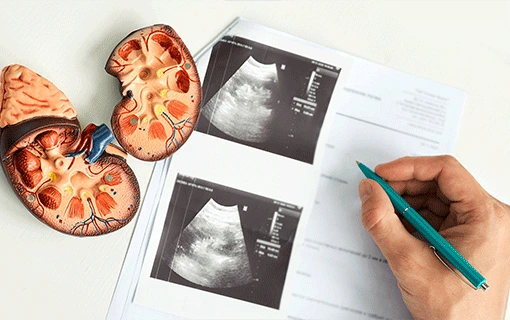Conditions / Renal Transplant
Renal Transplant

Overview
A renal transplant, also known as a kidney transplant, is a surgical procedure in which a healthy kidney from a donor is placed into someone whose kidneys no longer function properly due to end-stage renal disease (ESRD) or chronic kidney failure. Unlike dialysis, which only partially replaces kidney function, a successful transplant can fully restore kidney function and improve quality of life. While it is not a cure for kidney disease, a renal transplant offers patients a chance to have a longer, healthier, and more active life. Careful monitoring and lifelong medication are essential to prevent organ rejection.
Symptoms
Before transplant becomes necessary, people often experience symptoms of kidney failure such as:
• Fatigue and weakness: Due to toxin buildup and anemia.
• Swelling: In the legs, ankles, or around the eyes (fluid retention).
• Changes in urination: Less frequent, foamy, or dark-colored urine.
• Shortness of breath: Due to fluid overload or anemia.
• Confusion or difficulty concentrating: From toxin accumulation.
• Muscle cramps or restless legs: Especially at night.
• Persistent nausea or metallic taste: From buildup of waste in the blood.
When to see a doctor
You may be considered for a kidney transplant if:
• You have chronic kidney disease stage 4 or 5 (kidney function below 20%).
• You are currently on dialysis or will need it soon.
• Other medical conditions are well-managed, and you’re healthy enough for surgery.
• A suitable donor is available—either from a living or deceased donor.
A transplant may be recommended before starting dialysis (called a preemptive transplant) for better long-term outcomes.
Causes
The most common causes of kidney failure that may require a transplant include:
• Diabetes: The leading cause of kidney disease.
• High blood pressure: Damages kidney blood vessels over time.
• Polycystic kidney disease: A genetic condition causing cysts in the kidneys.
• Glomerulonephritis: Inflammation of the filtering units of the kidney.
• Autoimmune diseases: Such as lupus or vasculitis.
• Recurrent kidney infections or blockages: Leading to chronic damage.
Risk Factors
People at greater risk of needing a transplant include those who:
• Have poorly controlled diabetes or hypertension.
• Have a family history of kidney disease.
• Are over age 60.
• Are African American, Hispanic, Native American, or Asian (higher risk for ESRD).
• Use certain medications long-term (like NSAIDs).
• Have repeated urinary tract infections or kidney stones.
Complications
While kidney transplants are generally successful, potential complications include:
• Organ rejection: The immune system may attack the transplanted kidney.
• Infections: Due to immunosuppressive medications.
• Blood clots or bleeding: After surgery.
• Side effects from medications: Including high blood pressure, high cholesterol, or bone thinning.
• Cancer risk: Slightly increased due to long-term immunosuppression.
• Delayed graft function: Sometimes the new kidney doesn’t work right away.
Medical Risk
Kidney transplant success relies on careful management before and after surgery. This includes:
• Immunosuppressive therapy: Lifelong medications like tacrolimus, mycophenolate, and corticosteroids to prevent rejection.
• Regular follow-ups: Frequent lab work and clinic visits to monitor kidney function.
• Infection prevention: Staying up to date on vaccines and avoiding exposure to illness.
• Healthy lifestyle: Staying hydrated, eating a kidney-friendly diet, and managing weight, blood pressure, and cholesterol.
• Emotional support: Counseling or support groups can help manage the emotional and psychological stress of transplant recovery.
With proper care, a transplanted kidney can function for 10–20 years or more, offering improved quality of life and freedom from dialysis.
Treatments
Explore treatment options tailored to your condition and location. Click below to find the nearest Thrivewell Infusion center and begin your journey to better care.
Medication We Offer
• Nulojix
